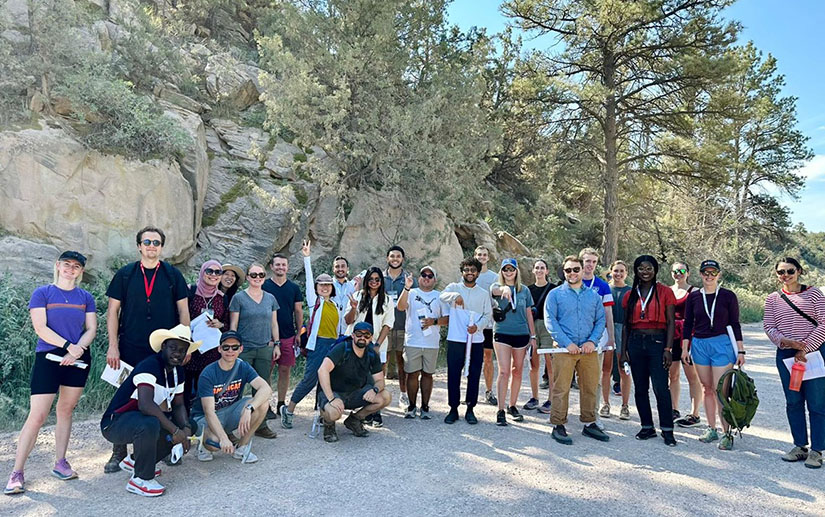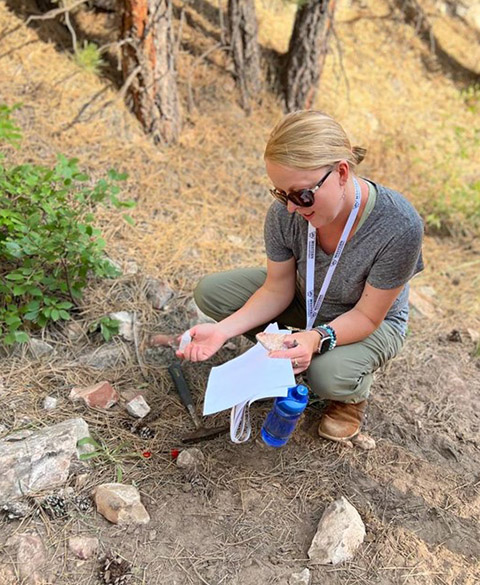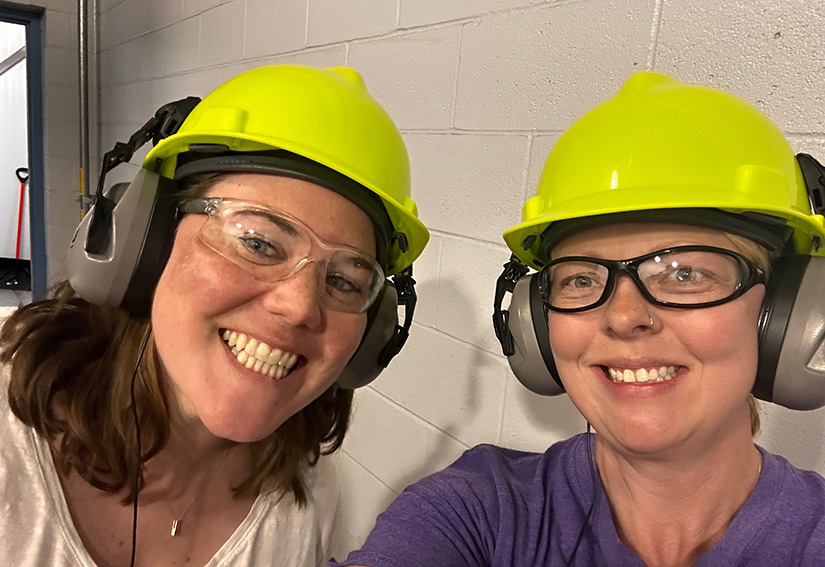NREL Helps Train the Future Carbon Management Workforce
Outlook on Decarbonizing our Economy Depends on Mentoring and Training STEM Students and Early-Career Professionals Today

Participants gathered during the 19th Annual Research Experience in Carbon Sequestration Program. The program was hosted in part at NREL in Golden, Colorado. Photo by Pamela Tomski, DOE
A net-zero carbon emissions future demands a workforce with the right training and hands-on experience to help mitigate greenhouse gas (GHG) emissions from the industrial, transportation, and electric power sectors.
Carbon management technologies—including carbon dioxide removal and carbon capture, utilization, and storage—need a constant influx of science, technology, engineering, and mathematics (STEM) talent to convert research into scalable commercial solutions.
The National Renewable Energy Laboratory (NREL) is a proud champion of workforce development opportunities that improve U.S. decarbonization goals while working toward an equitable and clean energy future. NREL is a key supporter of fellowship and research programs sponsored by the U.S. Department of Energy (DOE) Office of Fossil Energy and Carbon Management (FECM).
"NREL is honored and eager to support a STEM carbon management workforce with our expertise in carbon dioxide removal and conversion research and development," said Josh Schaidle, laboratory program manager of NREL’s Carbon Management Program. "This past summer, NREL researchers mentored three Mickey Leland Energy Fellows for the first time, in addition to hosting the annual Research Experience in Carbon Sequestration Program."
NREL Scientists Elevate STEM Students Through Mentorship Program
NREL researchers mentored three Mickey Leland Energy Fellowship (MLEF) Program students over the summer at the NREL campus in Golden, Colorado. The MLEF Program is sponsored by DOE's FECM and offers a 10-week research fellowship for undergraduate and graduate students seeking STEM majors.
Participants complete a cutting-edge research project at one of DOE’s national laboratories or DOE headquarters in support of the department’s mission to minimize the environmental impacts of energy resource recovery and use while working toward net-zero emissions. Each NREL mentor was pleased to support these early-career MLEF Program STEM students for the first time.
"The carbon management focus of MLEF programs is a good fit for NREL research, which enables us to define projects that excite and inspire these fellows," said Robert Bell, materials science researcher at NREL and MELF Program mentor. "By hosting these fellows, NREL can give early-career STEM researchers an incredible opportunity to participate in research beyond coursework and separate from their universities. I hope this is the start of a great tradition to come."
NREL's MLEF Program fellows received hands-on experience in the lab researching technologies such as sequestering carbon in value-added products from mining waste or making the capture of carbon dioxide and conversion to methanol more efficient. The students also learned the benefits and impact of working at a DOE national laboratory.
"My mentor always made time for me. He explained the project thoroughly and made sure that I understood my level of contribution," said Brenda Blanco, MLEF Program fellow and University of California, Riverside student. "I also appreciated that lab safety was a high priority. I felt safe working in the NREL labs and was aware that others were watching out for my physical safety."
Carbon Management Education and Training Gets a Boost From NREL

Liz Ware conducted field work in Wyoming while participating in the RECS program where she learned the fundamental principles of geologic storage of carbon dioxide. Photo by Pamela Tomski, DOE
Another way NREL encourages development of the next generation of carbon management researchers is through support of DOE FECM's Research Experience in Carbon Sequestration (RECS) Program.
The RECS Program is an annual two-week event for graduate students and early-career professionals that combines site tours, live lectures, group exercises, and field activities associated with carbon capture, utilization, and storage (CCUS) deployment. The 19th annual 2023 RECS Program was hosted in part by NREL in Golden, Colorado. There were 32 participants in this year's RECS program.
Anne “Liz” Ware, researcher for NREL's Renewable Resources and Enabling Science Center, is NREL's first participant in the RECS Program. Ware is leading a project funded by DOE's Office of Technology Transitions titled “Addressing Critical Measuring, Reporting, and Verification Challenges of Durability and Sustainable Sourcing of Feedstocks for Biomass Carbon Removal and Storage (BiCRS) Pathways.” Ware presented on her research at the RECS annual program.
"The BiCRS research team at NREL will collect and provide experimental data and develop life cycle analysis models to help industry partners track carbon, make decisions, and de-risk their processes," Ware said. "Measuring, monitoring, reporting, and verification frameworks are needed to transparently track carbon in CCUS/carbon dioxide removal (CDR) processes to ensure these technologies are solving the problems related to GHG emissions."
The personal and professional impact of the RECS program goes far beyond the lab and field. The diversity of program components involves real-world scenarios and problem-solving skills for carbon dioxide removal and storage strategies including environmental justice, permitting, communication skills, and geology field work.

RECS Program participants Emily Connor (left) from DOE and Liz Ware from NREL were inspired by the experience. Photo by Liz Ware, NREL
"The connections, technical knowledge, and experience built in less than two weeks are life changing, inspiring, and will make a real impact on our CCUS/CDR efforts," Ware said. "Seriously though, this is like a grown-up summer boot camp for cultivating a team of real superheroes that are going to save the world."
Learn more about NREL's support of internships and workforce development programs.

